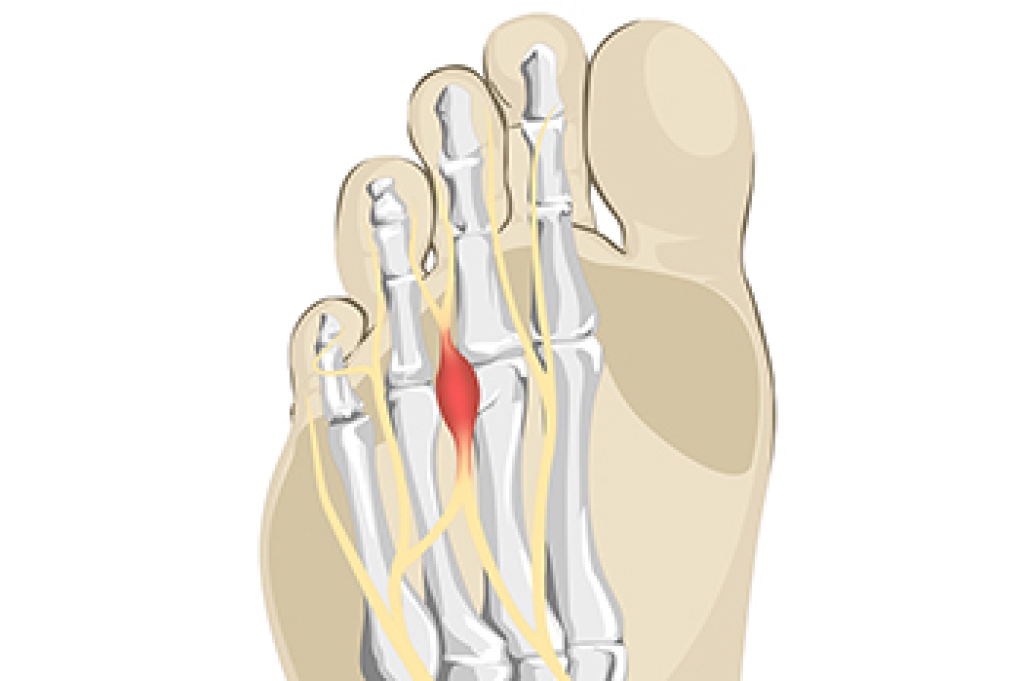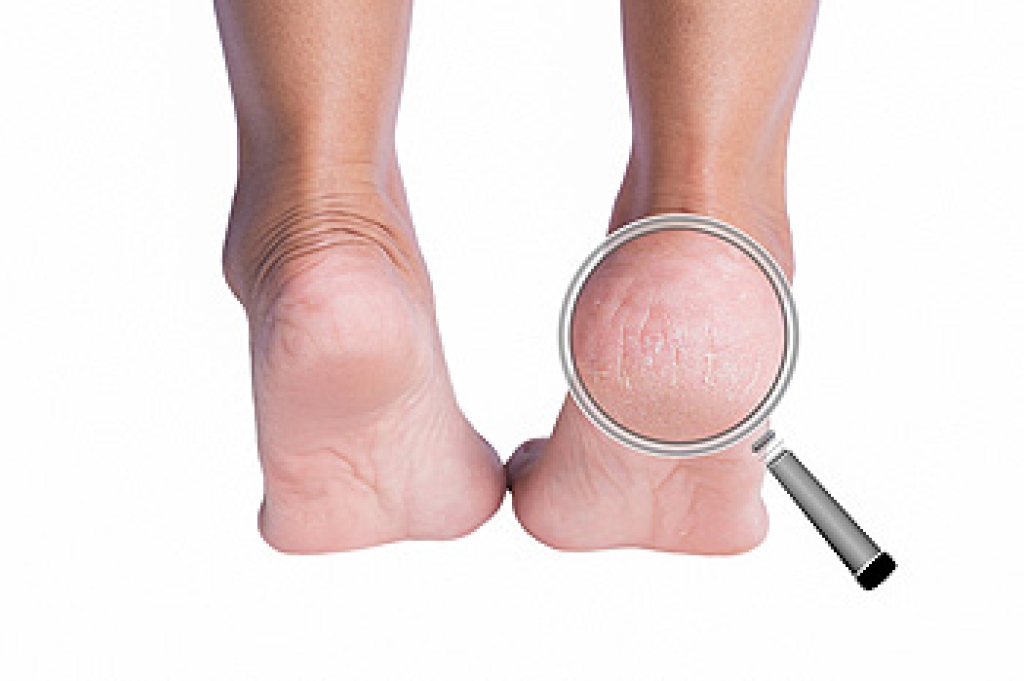Connect With Us
Blog
Blog
What Is Morton’s Neuroma?

Morton's neuroma is a painful foot condition that involves thickening and irritation of a nerve that runs between the metatarsal bones at the base of the toes. It is commonly caused by compression of the nerve, which disrupts normal sensation between the ends of the metatarsals. Wearing tight shoes that squeeze the forefoot can increase pressure in this area and worsen symptoms over time. Common signs include pain in the ball of the foot, a burning sensation, tingling, or the feeling of standing on a small pebble. A podiatrist can diagnose Morton's neuroma through a physical examination and imaging, when needed. Treatment may include footwear modifications, orthotics, targeted therapies, and pain relief strategies. If you have pain in this part of your foot, it is suggested that you schedule a visit with a podiatrist who can accurately diagnose and treat what may be going on.
Morton’s neuroma is a very uncomfortable condition to live with. If you think you have Morton’s neuroma, contact one of our podiatrists of Houston Foot and Ankle. Our doctors will attend to all of your foot care needs and answer any of your related questions.
Morton’s Neuroma
Morton's neuroma is a painful foot condition that commonly affects the areas between the second and third or third and fourth toe, although other areas of the foot are also susceptible. Morton’s neuroma is caused by an inflamed nerve in the foot that is being squeezed and aggravated by surrounding bones.
What Increases the Chances of Having Morton’s Neuroma?
- Ill-fitting high heels or shoes that add pressure to the toe or foot
- Jogging, running or any sport that involves constant impact to the foot
- Flat feet, bunions, and any other foot deformities
Morton’s neuroma is a very treatable condition. Orthotics and shoe inserts can often be used to alleviate the pain on the forefront of the feet. In more severe cases, corticosteroids can also be prescribed. In order to figure out the best treatment for your neuroma, it’s recommended to seek the care of a podiatrist who can diagnose your condition and provide different treatment options.
If you have any questions, please feel free to contact our offices located in Kingwood, Humble, The Woodlands, and Conroe, TX . We offer the newest diagnostic and treatment technologies for all your foot care needs.
Exercises That Support Strong and Healthy Feet

Exercises that focus on the feet can improve strength, flexibility, and overall stability. Yoga foot stretches gently lengthen muscles and tendons, helping improve balance and support proper alignment. Stable feet create a strong foundation in yoga and bring greater awareness to the entire body through controlled movement and grounding. Rolling the bottom of the foot on a firm surface provides myofascial release, which helps reduce tension in the plantar tissues and improve circulation. Through yoga, toe stretches improve mobility and reduce stiffness by lengthening the small muscles of the forefoot. Plantar fasciitis stretches focus on easing strain along the arch and heel to reduce pain and inflammation. A podiatrist can guide proper technique, recommend personalized exercises, and treat underlying conditions. If you have foot pain, it is suggested that you consult a podiatrist who can provide a proper diagnosis and treatment.
Why Stretching Is Important for Your Feet
Stretching the feet is a great way to prevent injuries. If you have any concerns with your feet consult with one of our podiatrists from Houston Foot and Ankle. Our doctors will assess your condition and provide you with quality foot and ankle treatment.
Stretching the Feet
Stretching the muscles in the foot is an important part in any physical activity. Feet that are tight can lead to less flexibility and make you more prone to injury. One of the most common forms of foot pain, plantar fasciitis, can be stretched out to help ease the pain. Stretching can not only ease pain from plantar fasciitis but also prevent it as well. However, it is important to see a podiatrist first to determine if stretching is right for you. Podiatrists can also recommend other ways to stretch your feet. Once you know whether stretching is right for you, here are some excellent stretches you can do.
- Using a foam roller or any cylindrical object (a water bottle or soda can will do), roll the object under your foot back and forth. You should also exert pressure on the object. Be sure to do this to both feet for a minute. Do this exercise three times each.
- Similar to the previous exercise, take a ball, such as a tennis ball, and roll it under your foot while seated and exert pressure on it.
- Grab a resistance band or towel and take a seat. If you are using a towel, fold it length wise. Next put either one between the ball of your foot and heel and pull with both hands on each side towards you. Hold this for 15 seconds and then switch feet. Do this three times for each foot.
- Finally hold your big toe while crossing one leg over the other. Pull the toe towards you and hold for 15 seconds. Once again do this three times per foot.
It is best to go easy when first stretching your foot and work your way up. If your foot starts hurting, stop exercising to ice and rest the foot. It is advised that you then see a podiatrist for help.
If you have any questions please contact our offices located in Kingwood, Humble, The Woodlands, and Conroe, TX . We offer the newest diagnostic and treatment technologies for all your foot and ankle needs.
How Foot Bones Work Together During Walking

The bones of the foot work together in a complex and well-coordinated way during walking to support balance, movement, and shock-absorption. As the heel strikes the ground, rearfoot bones provide stability and weight-bearing support. During mid-stance, the midfoot bones help distribute pressure evenly across the arch, allowing smooth forward motion. At push-off, the forefoot bones create leverage and flexibility for efficient propulsion. Ligaments and muscles support these bones to maintain proper alignment and reduce stress on joints. When bone movement is altered, pain or injury may occur. A podiatrist can evaluate gait mechanics, identify structural concerns, and provide customized treatments such as orthotics and strengthening plans. If you have foot pain while walking, it is suggested that you consult a podiatrist who can treat various foot and ankle conditions.
If you have any concerns about your feet, contact one of our podiatrists from Houston Foot and Ankle. Our doctors can provide the care you need to keep you pain-free and on your feet.
Biomechanics in Podiatry
Podiatric biomechanics is a particular sector of specialty podiatry with licensed practitioners who are trained to diagnose and treat conditions affecting the foot, ankle and lower leg. Biomechanics deals with the forces that act against the body, causing an interference with the biological structures. It focuses on the movement of the ankle, the foot and the forces that interact with them.
A History of Biomechanics
- Biomechanics dates back to the BC era in Egypt where evidence of professional foot care has been recorded.
- In 1974, biomechanics gained a higher profile from the studies of Merton Root, who claimed that by changing or controlling the forces between the ankle and the foot, corrections or conditions could be implemented to gain strength and coordination in the area.
Modern technological improvements are based on past theories and therapeutic processes that provide a better understanding of podiatric concepts for biomechanics. Computers can provide accurate information about the forces and patterns of the feet and lower legs.
Understanding biomechanics of the feet can help improve and eliminate pain, stopping further stress to the foot.
If you have any questions please feel free to contact our offices located in Kingwood, Humble, The Woodlands, and Conroe, TX . We offer the newest diagnostic and treatment technologies for all your foot and ankle needs.
Cracked Heels and Why Proper Foot Care Matters

Cracked heels are a common foot condition where the skin surrounding the heel becomes dry, thickened, and split. Symptoms may include rough skin, visible fissures, pain, bleeding, and discomfort when walking. This condition often develops due to a lack of moisture, repetitive pressure on the heel, wearing open back shoes, and the buildup of dead skin cells. Medical conditions such as diabetes, eczema, and poor circulation can also contribute to cracked heels. Risk factors include prolonged standing, obesity, aging skin, and walking barefoot on hard surfaces. A podiatrist can safely remove thickened skin, treat painful cracks, recommend moisturizing treatments, and address underlying health concerns. If cracked heels are causing pain or affecting daily activities, it is suggested that you consult a podiatrist who can offer effective treatment solutions, which may include prescribed medication.
If the skin on your feet starts to crack, you may want to see a podiatrist to find treatment. If you have any concerns, contact one of our podiatrists from Houston Foot and Ankle. Our doctors can provide the care you need to keep you pain-free and on your feet.
Cracked Heels
It is important to moisturize your cracked heels in order to prevent pain, bleeding, and infection. The reason cracked heels form is because the skin on the foot is too dry to support the immense pressure placed on them. When the foot expands, the dry skin on the foot begins to split.
Ways to Help Heal Them
- Invest in a good foot cream
- Try Using Petroleum Jelly
- Ease up on Soaps
- Drink Plenty of Water
Ways to Prevent Cracked Heels
- Moisturize After Showering
- Skip a Shower
- Keep Shower Water Lukewarm
- Don’t Scrub Your Feet
If you are unsure how to proceed in treating cracked heels, seek guidance from a podiatrist. Your doctor will help you with any questions or information you may need.
If you have any questions, please feel free to contact our offices located in Kingwood, Humble, The Woodlands, and Conroe, TX . We offer the newest diagnostic and treatment technologies for all your foot care needs.
Blog Archives
- 2026
- 2025
- 2024
- 2023
- 2022
- 2021
- 2020

